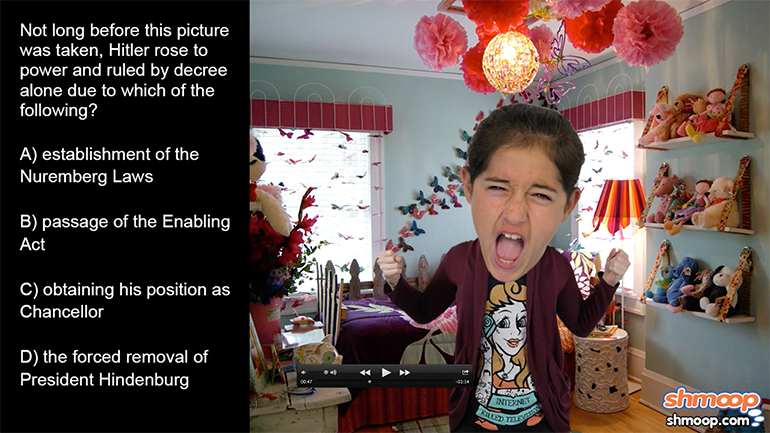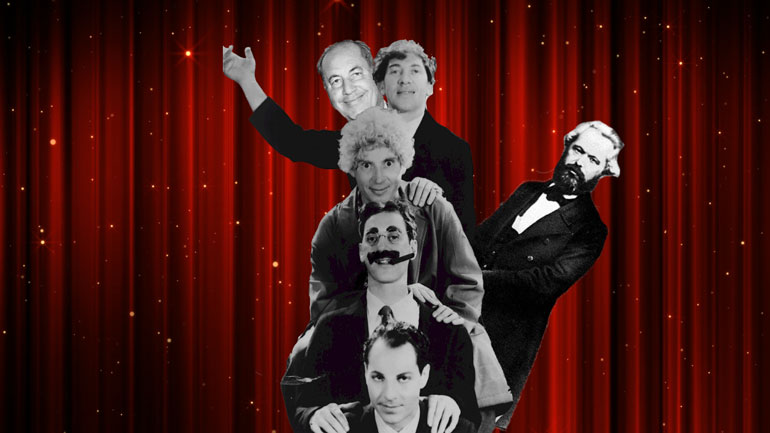ShmoopTube
Where Monty Python meets your 10th grade teacher.
Search Thousands of Shmoop Videos
AP European History 2.3 Period 3: 1815-1914 18 Views
Share It!
Description:
AP European History 2.3 Period 3: 1815-1914. Critics denounced the type of art depicted above because they believed it introduced which of the following?
Transcript
- 00:04
And here's your shmoop du jour brought to you by social conditioning [People working out in a gym class]
- 00:07
group fitness classes for the extrovert take a look at the image in this thing
- 00:12
right there...Thank You Pablo alright here's today's question critics
- 00:18
denounced the type of art depicted above because they believed it introduced
- 00:21
which of the following and here your potential answers..... okay
Full Transcript
- 00:27
you read that right Pablo Picasso had critics many of them keep that in mind [Person looking at picasso painting]
- 00:32
when you're dealing with negative comments on your own YouTube channel
- 00:35
people yeah so what were these critics so critical of did they think that his
- 00:41
work introduced be social conditioning well no because that's a term that [Social conditioner bottle appears]
- 00:45
applies to social sciences like sociology and psychology and while
- 00:49
Picasso's work was sometimes a bit of a mind trip he had little to do with the [Man admiring Picasso paintings]
- 00:53
study of it and he didn't explore international commerce either that's
- 00:57
more the work of economists and philosophers and wouldn't exactly make
- 01:00
the most interesting subject for art unless your definition of art includes
- 01:04
pie charts and graphs and stuff in which case well you do you so that eliminates [Pie chart and graph appears]
- 01:10
B&D did Picasso's haters denounce his work because it depicted C traditional
- 01:16
French culture well although Picasso spent most of his life in France his [Picasso painting by the Eiffel Tower]
- 01:20
work didn't often explore traditional French culture which was ultimately sort
- 01:24
of the problem Picasso probably would have been better received of his work
- 01:28
was all you know Eiffel Towers and poodles and those tacky throw pillow [Drawings of Eiffel Towers and a poodle]
- 01:32
things but it wasn't and that was exactly the problem so we can lose see
- 01:36
that means that Picasso's critics denounced his work because they believed
- 01:39
it introduced a foreign perversions see the French were being a little closed
- 01:44
minded here and considered Picasso's work to be perverse in nature because it [Man stood by drawings on a wall]
- 01:49
was influenced by foreign culture in this case African culture we wonder if
- 01:53
those close minded Frenchie's that would have hated the lion king to anyway
- 01:57
a is the correct answer but don't feel too bad for Picasso he wasn't losing any
- 02:01
sleep over the review the only thing keeping him up at night would be the [Picasso laying in bed]
- 02:04
fact that he was sleeping on piles and piles of money try not to remember that
- 02:09
fact when you're dealing with YouTube haters and
- 02:11
sitting on a pile of penny [Girl sitting on pile of pennies]
Up Next
AP European History Period 1: 1450-1648 Drill 2, Problem 1. As a result of the meeting in the image, which of the following occurred?
Related Videos
AP European History Period 3: 1815-1914 Drill 2, Period 1, Les Demoiselles d'Avignon represented the beginning of which of the following art m...
AP European History Period 3: 1815-1914 Drill 2, Problem 4. Paintings like the one depicted above were a direct reflection of what?
AP European History 1.2 Period 4: 1914-Present Not long before this picture was taken, Hitler rose to power and ruled by decree alone due to which...
AP European History 1.4 Period 3: 1815-1914. As evidenced through the passage above, Karl Marx was a passionate leader and is considered the father...




